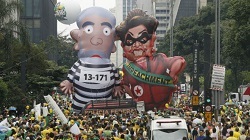Mounting citizen protests amid widening corruption investigations are putting pressure on Brazil’s economic and political leaders, although there are still significant barriers to the successful prosecution of Brazilian elites involved in criminal activity.
On Sunday, March 13 protesters in cities across Brazil took to the streets. Between 500,000 and 1.4 million people attended the São Paulo protest, making it one of the largest since the end of military rule in the 1980s, reported the New York Times.
The protestors expressed discontent over the economic downturn in Brazil, and mounting corruption scandals involving government and business elites. The largest scandal—deemed operation “Car Wash”— involved executives at state-run oil company Petrobras who issued inflated contracts to private businesses in exchange for bribes and kickbacks, some of which were laundered and used in political campaigns.
Many top-level politicians and businessmen have been implicated in the scandal. Most recently, on March 8, a Brazilian businessman was sentenced to 19 years in prison for charges related to the Car Wash scheme, and on March 9, prosecutors charged former president Luiz Inácio Lula da Silva with involvement in the scandal.
So far, current President Rousseff has been able to avoid charges in the case, or impeachment for her involvement, although she chaired Petrobras from 2003 to 2010, when much of the corruption appears to have occurred, and also served as Chief of Staff for Lula da Silva.
The recent protests are once again calling for Rousseff’s removal, with protestors carrying effigies of the president with a sash around her waist with the words “impeachment.”
InSight Crime Analysis
Brazil is the latest in a string of Latin American countries that are seeing the exposure of corruption at the highest levels. Salvadoran authorities are investigating three former presidents, while revelations of corruption in Guatemala led to massive citizen protests and the resignation of President Otto Perez Molina and the arrest of Vice President Roxana Baldetti last year. However, there are still many barriers to reaching the utmost echelons of power in the Brazil corruption case.
SEE ALSO: Coverage of Elites and Organized Crime
Brazilian prosecutors have been criticized for making plea bargains with top officials, quietly reducing their prison time after initial harsh sentences in exchange for implcating others in the corruption scandal.
In addition, the recent resignation of Brazilian Justice Minister José Eduardo Cardozo may indicate that the Rousseff’s Workers Party (Partido dos Trabalhadores – PT) is pressuring justice officials to ease up on investigations — Cardozo came under intense criticism from high-level party officials for his ardent investigations into the Car Wash scandal, with accusations that he was giving police free rein.
The New York Times also reports that Rousseff said that she would be “extremely proud” to have the former President Lula da Silva in her cabinet. Such a move would give Lula da Silva immunity to prosecution except by Brazil’s highest court, a move that would allow him to avoid arrest and delay his trial.
It remains to be seen if continued investigations and increased citizen outrage will be enough to counter elite strategies to avoid prosecution in corruption cases in Brazil and force the impeachment of the president.

